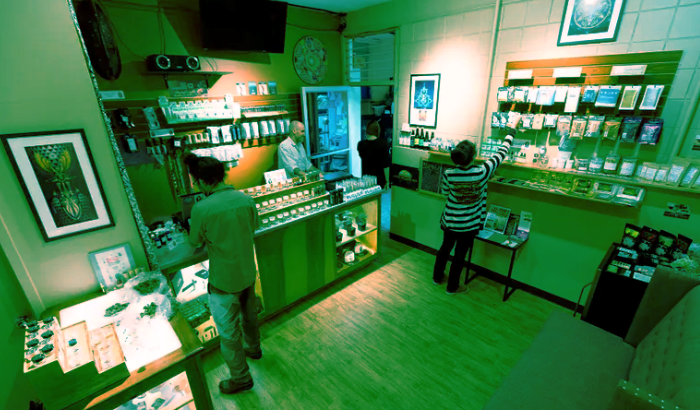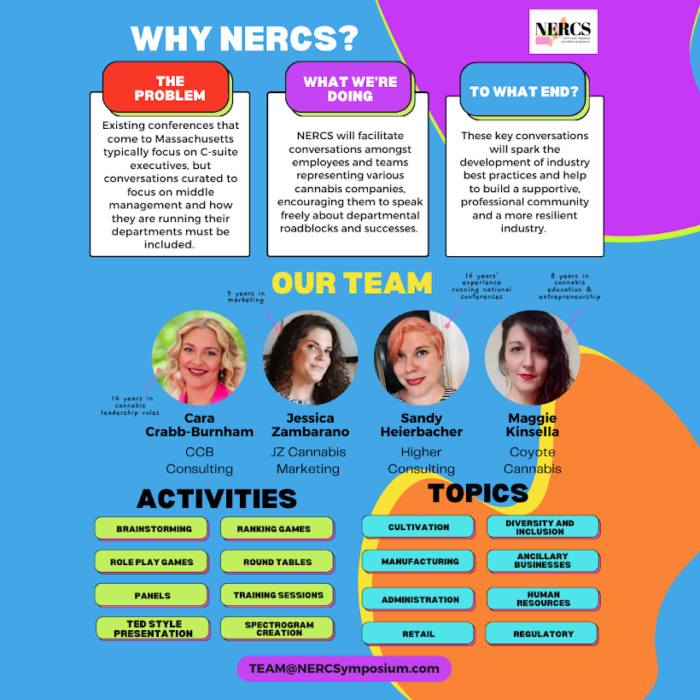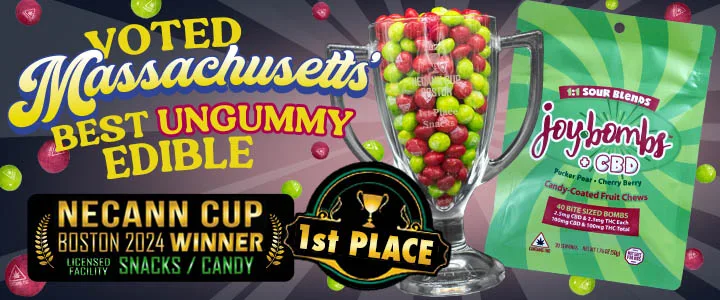
“Compliance and training often take a backseat to growth and sales, resulting in issues that can lead to significant losses, hefty fines, or even extended periods of shutdown.”
Back in 2010, Skunk magazine put Cara Crabb-Burnham on its cover, noting that the budding activist and then-cannabis radio host “can’t help but try to contribute and make the world a better place, wherever and whenever she can.” While Crabb-Burnham had only “been involved for over two years,” writer Diane Fornbacher called her subject a “seasoned professional” and said she was “primed for a long career in drug policy and reform advocacy.”
More than a decade later, those predictions have panned out. Crabb-Burnham has been heavily involved and impactful on many fronts, from the fight for medical cannabis through adult-use and the challenges faced by industry stakeholders today. Her current work is focused on education, professional development, and improving the retail experience for everyone—workers, shoppers, and ultimately owners and investors who she says only stand to benefit from proven, prudent, and responsible management practices.
In August, Crabb-Burnham will be part of a team hosting the North East Regional Cannabis Symposium (NERCS), where they will “facilitate conversations amongst mid-level managers, team leaders, and key employees of licensed cannabis businesses in the northeast.” “By encouraging open and honest talk,” the organizers hope, “NERCS will spark the development of industry best practices while building a supportive, professional community and a more resilient industry.”
We’re always open to an honest conversation about cannabis, and so we asked Crabb-Burnham a bunch of questions ahead of her big event.
Chris Faraone: First, for those who aren’t familiar with your work in the past, can you give us a snapshot of your history in cannabis, from media to activism to education.
Cara Crabb-Burnham: I’m a cannabis professional with a passion for making a positive impact in the industry. I’ve been immersed in this field since 2009, starting off as a community leader and activist right here in Massachusetts. One of my proudest accomplishments was co-founding a chapter of the Emerson College Students for Sensible Drug Policy, where we worked tirelessly to advocate for sensible drug policies.
I’ve had the opportunity to serve in various leadership positions, including roles at the Massachusetts Cannabis Reform Coalition and Northeastern Institute of Cannabis. In 2016, I took on a challenge that was close to my heart: advocating against the policy of testing newborns for cannabis at the Brigham and Women’s Hospital. I’m thrilled to say that our efforts led to a change in that policy, making a positive impact on countless families.
Another exciting chapter in my career was co-founding ELEVATE Northeast, a nonprofit organization dedicated to supporting the cannabis industry through education and networking. As the director of education, I’ve been able to develop and lead various cannabis educational programs, sharing knowledge and empowering individuals to thrive in this dynamic industry.
Along the way, I’ve had the pleasure of collaborating with incredible teams at EVIO Labs and Boston Cannabis Week, where I further honed my expertise. Now, I’m excited to bring all that experience and passion to my very own consulting firm, CCB Consulting LLC. My focus is on providing top-notch client-based services, including workforce training and compliance guidance. I firmly believe in the power of education and compliance to drive success in the cannabis world, and I’m here to help individuals and businesses thrive while staying on the right side of regulations.
It’s been an incredible journey so far, and I can’t wait to continue making a positive impact in the cannabis industry.
It seems like your current project is built on a lot of the different roles you have had in the past. How did you come to form the mission for your consulting business?
My expertise lies in developing compliance programs, network development, and strategy. I thrive when working with partners who share a common mission, rather than being a boss or working for one. Recognizing this has solidified my decision to focus on my top skills and offer them to as many groups as possible. And let me tell you, it has been a game-changer for me and everyone I work with.
When it comes to understanding cannabis, I take a holistic approach. While I wouldn’t call myself an expert in any specific area, I can fluently discuss all aspects of the industry, from policy and cultivation to licensing and wholesale markets. I genuinely enjoy diving into the regulations and support documents from different states and territories, observing their unique priorities for various communities.
Unfortunately, compliance and training often take a backseat to growth and sales, resulting in issues that can lead to significant losses, hefty fines, or even extended periods of shutdown. The industry grew at such a rapid pace that it wasn’t adequately prepared to handle the challenges it faced. This has left many employees dissatisfied, owners frustrated, and consumers disconnected. Furthermore, the high turnover rates, costs associated with turnover, and lack of institutional knowledge among upper and middle management have only added to the confusion.
After nearly a decade of vocational training in the cannabis field, I had an epiphany. There was no coordinated effort to bring the workforce together through workshops across different businesses, creating a valuable resource network. While there are numerous events catering to owners, decision-makers, investors, and support businesses, there was a glaring gap when it came to cannabis workforce development. That’s when I realized there were several approaches to addressing this issue, and I wanted to create a responsive space that proactively tackles the challenges faced in this area.
You cover a lot of areas, but what are you especially focused on at the moment?
In my consulting business, I’m always excited to welcome new operators who have provisional licenses in Massachusetts or similar licenses in other states. My goal is to support them throughout the process of becoming operational and compliant. This involves understanding the relevant regulations, grasping the vision of their business, and collaborating with them to create a plan that regulators will approve. I assist with various aspects, including regulatory responses, facility design, mock inspections, and [standard operating procedure] SOP development.
Alongside my executive duties, I’m still actively involved with ELEVATE Northeast. I manage the scholarship fund and coordinate and teach the CORE workforce training program in partnership with Holyoke Community College.
Having spent considerable time working with entrepreneurs and start-up businesses, it has given me a unique perspective on working within companies. Cannabis entrepreneurs often have a forward-minded, future-focused approach, while experienced managers excel at focusing on the immediate tasks and understanding how all the gears and pieces work together on a day-to-day basis. It often takes time for these two types of individuals to sync up once the business is up and running, leaving employees to figure things out on their own.
One of my dreams is to see the workforce in the cannabis industry, state-by-state or region-by-region, develop meaningful relationships that can be utilized as valuable resources. I find myself frequently relaying messages between employees, sharing Metrc tips and tricks, cultivation hacks, and compliant retail sales tools, among other things. If dispensary managers in the cannabis industry can build strong relationships with each other and become a reliable resource, it would greatly enhance the efficiency of all businesses. After all, efficiency leads to profitability.

Before we get into the survey, what is your experience with budtenders, teaching them, etc.?
First and foremost, I have to admit that I’m not a fan of the term “budtender.” Personally, I prefer using more inclusive and professional terms like “retail associates,” “patient services associates,” or even “badged agents.” It’s all about creating an atmosphere that reflects the professionalism and diversity of our industry.
In the classroom setting, my experience has been absolutely fantastic. I’ve had the opportunity to meet, train, and work with numerous individuals who entered the sales space with a comprehensive understanding of the entire cannabis industry. They grasp how the decisions made in retail impact cultivation, and how choices in cultivation affect manufacturing, and so on. What’s more, they recognize the importance of compliance, safety, and maintaining professional standards within our industry.
However, out in the real world, I’ve encountered some concerning situations. I’ve heard phrases like, “I don’t think it has a cannabinoid label,” or “Well, I thought it was good, so you should too.” There’s also the misconception that the age of a product (such as flower) doesn’t matter because it’s always the same. One of my personal favorites is when salespeople are unaware that brands and manufacturers can be two different entities. And let’s not forget those times when they get defensive when I take the time to check the dates on every product before making a purchase (which is something I believe we all should do).
I firmly believe that we can and should strive for better. Retailers should be actively informing their teams about important events like NECANN, and they should be encouraging professional development. We need cannabis employees who are highly competent adults, 21 and over. We require individuals who are over 21, can comprehend complex compliance expectations, maintain meticulous records, and deliver exceptional service. In order to retain such high-caliber employees in customer-facing roles, we must treat them well, compensate them fairly, and provide them with safe working environments. It’s in everyone’s best interest to foster a positive and supportive work environment.
Why did you develop the survey and how did you go about setting it up?
The survey we’re conducting is a direct response to the tragic death of Lorna McMurrey, as well as countless conversations I’ve had with cannabis employees who have faced similar challenges. These issues include inadequate training, lack of oversight, micromanagement, poor communication, decision-making without follow-through, limited resources, complex management structures, a boys-club mentality, and even instances of racism and sexism. While these problems are prevalent in the cannabis industry, I don’t believe they are unique to it. If we were to speak with individuals from the early days of the tech era, they would likely share similar experiences (minus the strict regulatory requirements).
When I first started collecting data through a Google form, it was mainly out of curiosity. I wanted to understand why I was repeatedly hearing these stories and wanted to gather insights from people beyond my personal network. However, as I delved into the responses, I realized the need to support these individuals who consistently face these challenges. They deserve to take control of their situations and their jobs. They need a safe space where they can be seen and heard, and a platform to share their thoughts and experiences in a way that can be useful to decision-makers at a larger scale.
What are your goals for the survey? What do you plan to do with any data and reports generated?
We’re excited to share our plans for the North East Regional Cannabis Symposium (NERCS) and how we’ll be using the valuable data from the survey. Our main focus is to create a dynamic and supportive environment that truly puts employee well-being first. By incorporating engaging activities such as networking sessions, department-specific roundtable discussions, brainstorming sessions, ranking games, and group [Strengths, Weaknesses, Opportunities, and Threats] SWOT analysis, we’ll address the specific needs and concerns expressed by the survey respondents.
The survey results will play a vital role in shaping the event’s agenda. They will help us determine which areas to prioritize, guide us in formulating relevant questions, and identify the topics that participants are most eager to discuss. All the insights and experiences shared during the event will be carefully documented and compiled into a comprehensive report.
This report will be made available to companies that choose to purchase an engagement bundle, as well as regulatory bodies like the Cannabis Control Commission, upon request. What’s truly significant about this report is that it will authentically represent the voices of the employees, without any filters or bias. We believe that by presenting their perspectives directly, we can contribute to informed decision-making processes that lead to positive changes in the industry.
How can people go about actually pushing dispensaries and employers to make changes that people in your survey say are needed?
We genuinely want to make a positive difference in the lives of the staff and create a supportive work environment. That’s why we’re planning NERCS. It’s going to be a proactive and responsive gathering that prioritizes the well-being of employees.
During NERCS, we’ll have engaging activities like networking sessions, roundtable discussions tailored to different departments and licenses, brainstorming sessions, fun ranking games, and even group SWOT analyses. It’s all designed to address the specific needs and concerns identified through the survey. We want to ensure that we’re covering the topics our teams care about most.
The insights we gather from the survey responses will be invaluable in shaping the focus areas of our event and crafting thoughtful questions. We truly want to hear your thoughts and experiences, and your input will guide us in making NERCS as beneficial as possible. Rest assured, all the information collected during the event will be compiled into a comprehensive report. This report will be shared with companies that purchase an engagement bundle, as well as the Cannabis Control Commission and other regulatory bodies upon request. It’s crucial to us that employees’ voices are heard loud and clear, without any filters or biases, so that it can contribute to making the best decisions moving forward.
With the data we collect and the personal conversations we have, we hope to empower employees to stand up for themselves and make use of their resource networks to shape their work environments for the better. They deserve to feel supported and valued in their careers. Our ultimate goal is to drive positive change within the cannabis industry by amplifying the voices and experiences of the people who matter most—the dedicated and passionate employees. Together, we can make a real impact.

























